Crossref Citations
This article has been cited by the following publications. This list is generated based on data provided by Crossref.
Law, Wing-Wah
and
Pan, Su-Yan
2009.
Game theory and educational policy: Private education legislation in China.
International Journal of Educational Development,
Vol. 29,
Issue. 3,
p.
227.
Ereiz, Suzana
Fernando Jiménez-Alonso, Javier
Gallegos-Calderón, Christian
Duvnjak, Ivan
and
Pina Limongelli, Maria
2024.
Vibration based single-objective finite element model updating using cooperative game theory approach.
Mechanical Systems and Signal Processing,
Vol. 212,
Issue. ,
p.
111316.



